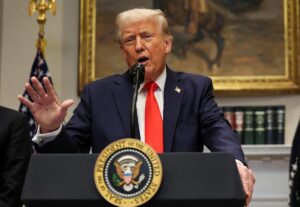Understanding Market Reactions to Tariff Policies: The Trump Administration’s Approach
As the volatility in U.S. stock markets continues, investors are reminded of President Trump’s unique approach to economic policy, particularly his tariffs on imports. Recently, the announcement of additional tariffs sent shockwaves through equity markets, sparking a notable two-day decline. This tempest in the market has left many wondering just how much influence the President has over market sentiment and policy adjustments.
The Tariff Effect
The market’s downturn was underscored by a significant selloff, marking the worst two-day performance since December. Yet, within this chaos, a sliver of hope emerged: Commerce Secretary Howard Lutnick hinted at a potential pathway for tariff relief concerning Mexico and Canada. This speculative promise led to an immediate, albeit brief, rally in stock-index futures, showcasing how even whispers from the administration can impact investor confidence.
The "Trump Put"
Wall Street’s response also highlights a critical concept in finance known as the “Trump put,” a term referring to the expectation that the President will safeguard the stock market’s wellbeing, especially when it falters. Advisors and strategists are keenly aware that any policy causing investor anxiety may lead to a quick retreat from such positions. In essence, this "Trump put" level is perceived as a price point or threshold, below which traders anticipate intervention or supportive commentary from the administration.
According to strategists from Bank of America, the original threshold for this put was around the S&P 500’s closing level on Election Day. However, with the index recently brushing close to that mark, many investors are left questioning how much longer they can rely on this supposed safety net.
Mixed Signals
Despite Lutnick’s comments, signals from the Trump administration remain ambiguous. Over the years, Trump has exhibited a tendency to sway in his economic policy stance, leading some analysts to speculate on the consistency of his administration’s approach to tariffs. Notably, President Trump has adopted a noticeably quieter stance on market performance during his second term, with far fewer public declarations about the importance of stock market gains compared to his first term. In fact, since November, Trump has only referenced the stock market once, raising concerns about his current disposition toward financial markets.
The Weight of Tariffs
History reminds us that tariffs can have far-reaching economic implications. A 2019 National Bureau of Economic Research study indicated that the imposition of tariffs contributed to a monthly decrease of $1.4 billion in U.S. real income by the end of 2018, primarily impacting domestic consumers. The potential short-term gains from such protectionist measures often mask the longer-term pain that markets may experience, hence the hesitation some investors feel regarding the sustainability of Trump’s policies.
The Need for Caution
Strategists suggest that a more significant downturn in the market may be necessary for Trump to reconsider his aggressive tariff stance. Some believe that a market pullback of at least 10% could prompt a reevaluation of current tariffs, igniting a full-scale conversation around adjusting or reversing them. In the face of fluctuating tariffs on imports from Mexico and Canada (25% on most goods, with energy products at 10%), much hangs in the balance for U.S.-based corporations, especially those in the manufacturing sector.
A Future Driven by Uncertainty
The broader takeaway for investors is clear: While Trump’s administration may adjust its actions in response to market pressures, the overall health of the U.S. economy and financial markets will likely remain influenced by macroeconomic conditions. As uncertainties persist—from tariffs to economic forecasts—the sentiment in financial markets can quickly turn sour.
At Extreme Investor Network, we aim to equip you with the insights and analyses necessary to navigate these turbulent waters. Whether you are a seasoned investor or just starting, staying informed of the shifting dynamics in fiscal policy can empower you to make smarter investment decisions. As we watch the evolution of the equity markets in response to political maneuvers, remember that a well-rounded investment strategy accounts for both short-term market reactions and long-term economic principles.

